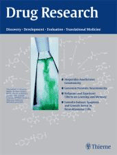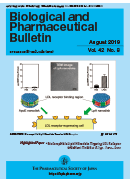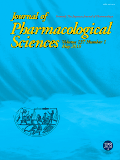
European Journal of Pharmacology
Scope & Guideline
Shaping the future of pharmacology through impactful scholarship.
Introduction
Aims and Scopes
- Pharmacodynamics and Pharmacokinetics:
The journal emphasizes studies that investigate the pharmacodynamics (effects of drugs on biological systems) and pharmacokinetics (how drugs are absorbed, distributed, metabolized, and excreted) of various agents, providing insights into their therapeutic potential and safety. - Drug Mechanisms and Molecular Pathways:
Research focusing on the molecular mechanisms through which drugs exert their effects, including signaling pathways, receptor interactions, and cellular responses, is a core area of interest. - Translational Pharmacology:
The journal encourages studies that bridge basic pharmacological research with clinical applications, highlighting the translation of laboratory findings into practical therapeutic strategies. - Natural Products and Traditional Medicine:
There is a consistent focus on the pharmacological evaluation of natural products and traditional medicine, investigating their potential as therapeutic agents and understanding their mechanisms of action. - Toxicology and Safety Pharmacology:
Research addressing the toxicological aspects of drugs, including adverse effects, drug interactions, and safety profiles, is crucial for assessing the viability of pharmacological agents. - Innovative Drug Delivery Systems:
The journal includes studies on novel drug delivery methods, formulations, and nanotechnology, which aim to enhance the efficacy and safety of pharmacological treatments.
Trending and Emerging
- Ferroptosis and Cell Death Mechanisms:
There is an increasing focus on the role of ferroptosis, a form of regulated cell death, in various diseases, particularly in cancer and neurodegenerative disorders. This theme explores how modulating ferroptosis can provide therapeutic benefits. - Immunotherapy and Cancer Treatments:
The journal is seeing a rise in research related to immunotherapeutic approaches for cancer, including checkpoint inhibitors and the modulation of immune responses to enhance treatment efficacy. - Natural Products and Phytochemistry:
Research on the pharmacological properties of natural products and their derivatives is trending, indicating a renewed interest in exploring traditional medicine and natural compounds for modern therapeutic applications. - Microbiome and Pharmacology:
The interplay between the gut microbiome and pharmacology is gaining traction, with studies investigating how the microbiome influences drug metabolism, efficacy, and toxicity, emphasizing the importance of personalized medicine. - Neuropharmacology and Neurological Disorders:
Research related to neuropharmacology, particularly in the context of neurodegenerative diseases, pain management, and psychiatric disorders, is becoming increasingly prominent, reflecting the need for innovative therapeutic strategies. - Targeted and Personalized Medicine:
There is a notable trend towards studies that focus on targeted therapies and personalized medicine approaches, highlighting the importance of understanding individual patient responses to pharmacological treatments.
Declining or Waning
- Traditional Pharmacology Approaches:
While the journal previously published a significant number of articles focused on traditional pharmacological studies, there has been a noticeable shift towards molecular and mechanistic studies, leading to fewer articles on classical pharmacology. - Single-Drug Studies:
Research focusing solely on the effects of single drugs without exploring combination therapies or polypharmacy has decreased. There is a growing interest in understanding how drugs interact when used in combination, especially in chronic disease management. - Basic Animal Studies:
There has been a trend away from basic animal studies towards more complex in vitro models and clinical trials, reflecting a shift in the journal's focus towards research that has direct relevance to human health. - Pharmacology of Older Drugs:
The exploration of older, well-established drugs has decreased, with more emphasis placed on novel compounds or emerging therapies, which may indicate a shift in research interest towards innovation and new drug discovery.
Similar Journals

Pharmaceutical Sciences
Bridging research and practice to transform healthcare.Pharmaceutical Sciences, an esteemed journal published by Tabriz University of Medical Sciences, Faculty of Pharmacy, serves as a crucial platform for the dissemination of pioneering research in the fields of pharmaceutical science, pharmacology, and toxicology. With an impact factor reflective of its substantial contribution to the scientific community, this open access journal has been accessible since 2012, ensuring that researchers, professionals, and students worldwide can engage with its rich content. Located in Iran, it has continually evolved, covering research from 2009 to 2024, and boasts impressive rankings in multiple Scopus categories, including Q3 in Pharmaceutical Science and Q2 in Pharmacology, Toxicology and Pharmaceutics. By bridging gaps between scientific inquiry and practical applications, Pharmaceutical Sciences is dedicated to advancing pharmaceutical knowledge and promoting innovative practices that address significant health challenges.

Drug Research
Transforming Ideas into Therapeutic RealitiesDrug Research, published by GEORG THIEME VERLAG KG, is a pivotal journal housed in the vibrant realm of pharmacology and drug discovery. With a commitment to advancing the understanding of medicinal substances, this journal serves as an essential resource for researchers, professionals, and students dedicated to the field. The journal boasts an ISSN of 2194-9379 and an E-ISSN of 2194-9387, reflecting its dual commitment to print and digital accessibility. Despite its status as a Q3 journal in both Drug Discovery and Miscellaneous Medicine categories as of 2023, it continues to offer valuable insights with a focus on the latest innovations, methodologies, and findings in drug research. Based in Germany, Drug Research promotes scholarly communication and collaboration within the scientific community, ensuring that its contributions remain impactful in shaping future therapeutic discoveries. The journal is indexed in relevant databases, enhancing its visibility and reach, thus fostering a robust academic dialogue.

BIOLOGICAL & PHARMACEUTICAL BULLETIN
Unlocking New Horizons in Pharmaceutical ResearchBIOLOGICAL & PHARMACEUTICAL BULLETIN, published by the PHARMACEUTICAL SOC JAPAN, is a prominent peer-reviewed journal that serves the fields of medicine, pharmaceutical science, and pharmacology. With an ISSN of 0918-6158 and an E-ISSN of 1347-5215, this publication has been crucial in disseminating innovative research since its inception in 1993, and it continues to contribute significantly to the body of knowledge as it converges towards 2024. Despite being classified as a non-open access journal, it maintains a respectable Q3 ranking in Medicine (miscellaneous) and Q2 in Pharmaceutical Science, highlighting its critical role in advancing scientific discourse in these areas. With Scopus rankings placing it in the 51st percentile for Pharmaceutical Science and 38th percentile for Pharmacology, BIOLOGICAL & PHARMACEUTICAL BULLETIN is an essential resource for researchers, professionals, and students looking to stay abreast of cutting-edge developments and trends in biomedicine and drug development.

Advances in Pharmacological and Pharmaceutical Sciences
Pioneering Insights in Toxicology and Drug Development.Advances in Pharmacological and Pharmaceutical Sciences is a premier open-access journal published by Hindawi Ltd. based in the United Kingdom. Established in 2020, the journal swiftly garnered attention for its commitment to disseminating high-quality research in the realms of pharmacology, toxicology, and pharmaceutical sciences. It holds a commendable impact with notable quartile rankings, including Q2 in both Organic Chemistry and Pharmacology, indicating its importance within these disciplines. By embracing an open-access model, the journal ensures that research findings are widely available, promoting increased visibility and collaboration among researchers, professionals, and students globally. With an ongoing convergence of insights projected through 2024, Advances in Pharmacological and Pharmaceutical Sciences aims to address critical issues and advancements in drug development and therapeutic practices, making it an invaluable resource for those at the forefront of scientific inquiry in pharmacology and related fields.

BMC Pharmacology & Toxicology
Shaping the landscape of toxicological research.Welcome to BMC Pharmacology & Toxicology, a premier open-access journal dedicated to advancing the fields of pharmacology and toxicology. Published by BMC since 2012, this esteemed journal offers a platform for researchers, professionals, and students to disseminate cutting-edge research and innovative findings that explore the intricate interactions between drugs and biological systems. With its robust Q2 ranking in both general medicine and pharmacology categories for 2023, BMC Pharmacology & Toxicology is recognized for its significant contributions to the academic community, reflected in its strategic positioning within the 61st and 49th percentiles in Scopus rankings for related disciplines. The journal's commitment to open access ensures that vital research is accessible to a global audience, fostering collaboration and informed discussions. We invite you to engage with the latest studies, reviews, and innovative methodologies that shape the future of pharmacological and toxicological sciences.

Journal of Pharmacological Sciences
Exploring the frontiers of pharmacology and medicine.Journal of Pharmacological Sciences is a leading peer-reviewed academic journal dedicated to the field of pharmacology, published by the Japanese Pharmacological Society. Since its inception, this journal has offered an essential platform for the dissemination of high-quality research, contributing significantly to advancements in molecular medicine and pharmacology. With an impact factor that places it in the prestigious Q2 quartile for both categories, the journal has established itself as a credible source of innovative findings and methodologies since its transition to Open Access in 2015. This accessibility enables a broader audience, including researchers, healthcare professionals, and students, to engage with valuable insights and discussions pertinent to drug development, pharmacodynamics, and therapeutic strategies. Based in Kyoto, Japan, the journal serves as a vital resource for the global pharmacological community, encouraging collaboration and research that leads to improved health outcomes. For more information, submissions, and access to the latest research, visit the journal’s website.

International Journal of Pharmacology
Empowering Scholars to Shape the Future of PharmacologyWelcome to the International Journal of Pharmacology, a key publication in the field of pharmacology, published by ASIAN NETWORK SCIENTIFIC INFORMATION (ANSINET). Since its inception in 2006, this journal has provided a vital platform for researchers and professionals to disseminate their findings and insights in pharmacology, toxicology, and pharmaceutics. Despite recent discontinuation in Scopus coverage, the journal's dedication to fostering scientific dialogue continues to attract contributions from esteemed scholars globally. With an **ISSN of 1811-7775** and **E-ISSN of 1812-5700**, the journal seeks to bridge the gap between laboratory research and clinical application, promoting a deeper understanding of drug actions and interactions. Although it operates under traditional access options, the relevance of its published studies to ongoing pharmacological research remains significant.

Bangladesh Journal of Pharmacology
Transforming Insights into Pharmacological AdvancementsThe Bangladesh Journal of Pharmacology, published by the Bangladesh Pharmacological Society, is a leading platform dedicated to advancing knowledge in the field of pharmacology. With an ISSN of 1991-007X and an E-ISSN of 1991-0088, this open access journal has been making significant contributions to the field since its inception in 2006. Located at the Bangabandhu Sheikh Mujib Medical University in Dhaka, Bangladesh, the journal provides a vital resource for researchers, professionals, and students interested in pharmacology, toxicology, and pharmaceutics. As of 2023, the journal is categorized in the Q4 quartile for pharmacology, ranking 240th out of 313 in Scopus and falling within the 23rd percentile, reflecting its commitment to the dissemination of high-quality research. The journal encompasses a diverse array of topics from basic research to clinical applications, aiming to foster a deeper understanding of pharmacological principles and practices. By providing open access to its content, the Bangladesh Journal of Pharmacology ensures that valuable scientific findings are readily available to the global community, supporting the advancement of medical and pharmaceutical sciences.

Advances in Pharmacology and Pharmacy
Transforming Pharmacology Through Open Access InsightsAdvances in Pharmacology and Pharmacy is a pioneering journal devoted to the dissemination of cutting-edge research in the fields of pharmacology and pharmaceutical sciences. Published by Horizon Research Publishing, this peer-reviewed journal boasts a commitment to advancing knowledge and innovation, making it an essential resource for researchers, industry professionals, and students alike. With an ISSN of 2332-0036 and an E-ISSN of 2332-0044, it provides a platform for high-quality research articles that explore new therapeutic approaches, drug development strategies, and the regulatory aspects of pharmaceutical science. Although currently lacking a formal impact factor, the journal's emphasis on open access ensures that articles are widely available, promoting the sharing of valuable insights and collaborative efforts in the scientific community. Located at 506 N Garfield Ave, Ste 210, Alhambra, CA 91801, the journal welcomes contributions from diverse areas within pharmacology and pharmacy, reinforcing its significance as a vital resource in the ever-evolving landscape of pharmaceutical research.

Iranian Journal of Pharmaceutical Research
Transforming insights into impactful pharmaceutical advancements.Welcome to the Iranian Journal of Pharmaceutical Research, a pioneering publication in the field of pharmacology, toxicology, and pharmaceutics, published by BRIEFLAND. Established in 2002, this journal has been a crucial platform for disseminating innovative research and scholarly articles, contributing significantly to the advancement of pharmaceutical sciences in Iran and beyond. With an impressive trajectory leading towards a convergence of knowledge by 2024, it proudly holds a Q3 ranking in Pharmacology (Medical) and a Q2 ranking in the broader realm of Pharmacology, Toxicology, and Pharmaceutics for 2023. The journal's influence is underscored by its Scopus rank of #25/80 in General Pharmacology, Toxicology, and Pharmaceutics, placing it within the 69th percentile, therefore appealing to researchers, professionals, and students alike. Although the journal operates under a non-open access model, it remains dedicated to providing high-quality research articles that explore the latest advancements in pharmaceutical sciences, making it an essential resource for anyone involved in this vibrant field of study.